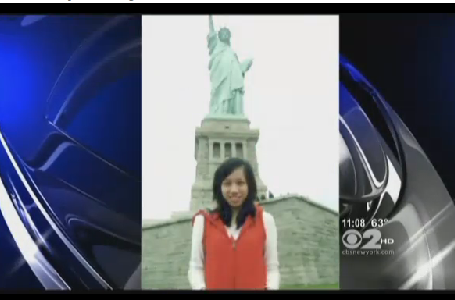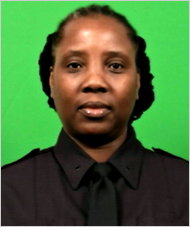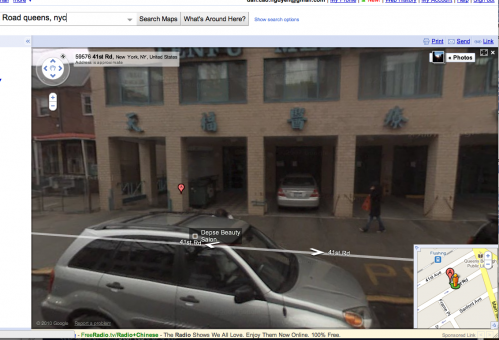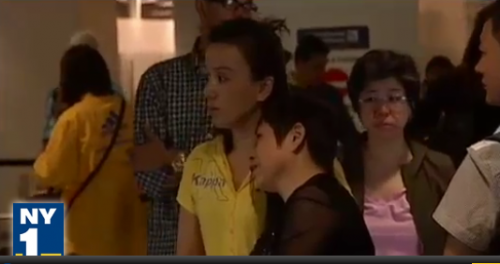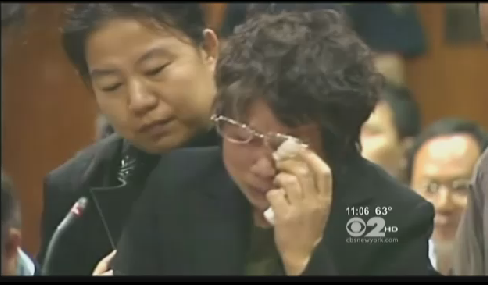Last May, I blogged about a murder case that caught my eye: Yu Yao, a 23-year-old Chinese immigrant, was raped and fatally beaten as she walked home from the grocery store in Flushing, Queens. Even in the statistically safe streets of New York, shocking crimes happen on a regular basis but the circumstances behind Yu’s death seemed especially tragic and senseless. Yesterday, Yu’s killer, 29-year-old Carlos Salazar Cruz, was sentenced to the maximum prison term of 22-years-to-life after pleading guilty to second-degree murder. Despite the resolution, neither the senselessness or tragedy of her death have lessened. I’ve updated my original post.
Tag Archives: crime
Is Solitary Confinement Torture? From Atul Gawande and the New Yorker
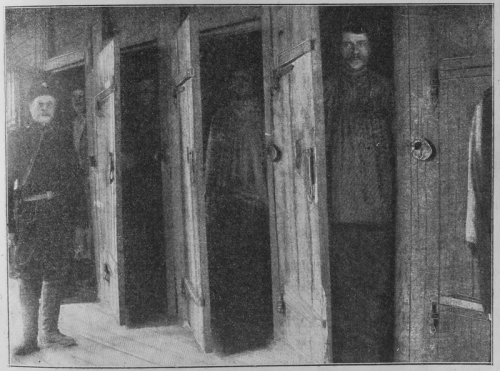
Punishment Cells. From: Page 257 of part II of Vlas Mikhailovich Doroshevich «Sakhalin (Katorga)», Moscow. Sytin publisher, 1905.
Thanks to longform.org for spotlighting another thought-provoking piece by Dr. Atul Gawande in the New Yorker. The tag line is: Hellhole: The United States holds tens of thousands of inmates in long-term solitary confinement. Is this torture?
Dr. Gawande’s reporting builds a strong case for “Yes.” Some interesting bullet points:
- America holds at least 25,000 inmates in solitary confinement in Supermax prisons
- More than a century ago, the U.S. Supreme Court considered banning solitary confinement
- A 2003 analysis of Arizona, Illinois, and Minnesota found that levels of inmate-on-inmate violence were unchanged after their supermax prisons opened
- The state of Maine has more inmates in long-term solitary than does all of England
Supermax prisons and the long-term isolation of large numbers of inmates, Dr. Gawande notes, is only a decades-old concept in the American prison system. However, in the 1890 SCOTUS case, Medley vs. U.S., the court takes note of a solitary confinement system in Philadelphia back in 1787. The conditions and consequences, noted more than two centuries ago, aren’t much different than what Dr. Gawande describes today:
The peculiarities of this system were the complete isolation of the prisoner from all human society, and his confinement in a cell of considerable size, so arranged that he had no direct intercourse with or sight of any human being and no employment or instruction….
A considerable number of the prisoners fell, after even a short confinement, into a semi-fatuous condition, from which it was next to impossible to arouse them, and others became violently insane; others still committed suicide, while those who stood the ordeal better were not generally reformed, and in most cases did not recover sufficient mental activity to be of any subsequent service to the community.
It became evident that some changes must be made in the system, and the separate system was originated by the Philadelphia Society for Ameliorating the Miseries of Public Prisons, founded in 1787.
Following the standard journalistic narrative, Dr. Gawande leads with his best anecdote and ends with his second-best. The entire piece is a must read, but the last anecdote is particularly astonishing. Gawande describes the case of Robert Felton, who spent 14 years of his 36 years on earth in solitary confinement. The isolation drove him crazy, Gawande writes, and Felton tried so many times to set his cell on fire with a lightbulb that “the walls of his cell were black with soot.”
Gawande writes about one of his last meetings with Felton. Felton had just found out the prison director who kept him in solitary confinement had just been convicted of bribery (from lobbyists, a sidestory that would probably illuminate why America holds on to certain prison strategies regardless of effect) and sentenced to two years in prison:
“Two years in prison,†Felton marvelled. “He could end up right where I used to be.â€
I asked him, “If he wrote to you, asking if you would release him from solitary, what would you do?â€
Felton didn’t hesitate for a second. “If he wrote to me to let him out, I’d let him out,†he said.
This surprised me. I expected anger, vindictiveness, a desire for retribution. “You’d let him out?†I said.
“I’d let him out,†he said, and he put his fork down to make the point. “I wouldn’t wish solitary confinement on anybody. Not even him.â€
NYPD’s Feris Jones is too old for this shit
“Lethal Weapon” reference inspired by @andymboyle
From the New York Times: Off-duty NYPD officer Feris Jones was at Sabine’s Hallway, a beauty salon in Bed-Stuy, Brooklyn, when a robber came in, brandishing a gun, and ordered her and the other patrons into a bathroom. Jones told the owner to call the bathroom before stepping out and ordering the robber to surrender. The robber, from 12 feet away, fired four shots at Jones with his .44 Magnum revolver. Jones dodged the bullets and returned fire with her own revolver five times, hitting the robber’s hands and causing him to drop his gun and hitting the front door lock, jamming it and slowing down the robber’s escape.
Five-time prior arrestee Winston Cox, 19, was apprehended at a Bed-Stuy hotel on Monday, his hands wrapped in towels.
Jones has been with the department since 1990 and worked in evidence collection for the past 12 years. The Oct. 23 attempted stickup was the first time she had fired her gun in the line-of-duty. Not only should her marksmanship should be commended, but her restraint and levelheadedness in not shooting the fleeing robber in the back (he apparently had to crawl out through a glass panel, even though moments before he nearly killed her. No wonder the suspect’s mother is proud of Jones.
Sometimes, life is like a cop movie.
Calm under pressure, New Orleans
Contrasting testimony in the New York Times’ story on the Danziger Bridge shootings:
“The federal government has clearly forgotten or chosen to ignore the circumstances police officers were working under and clearly chose not to factor in any of those circumstances when they decided to charge them with an intentional act of murder,†[lawyer] Mr. Eric Hessler said in an interview.
Some officers then traveled to the other side of the bridge and found two brothers, Ronald and Lance Madison, who were on their way to check on a dentist’s office that belonged to their oldest brother, Dr. Romell Madison. According to the indictment, Mr. Faulcon then shot Ronald Madison to death with a shotgun. Afterward, it continues, Sergeant Bowen kicked and stomped on Mr. Madison as he lay dying on the ground.
Who was Yu Yao? Rape-and-homicide case in downtown Flushing (updated)
Update 4/28/2011: – Carlos Salazar Cruz, 29, is sentenced to the maximum term of 22-years to life for confessing to the second-degree murder of Yu Yao.
Update 6/1/2010: The accused killer appears in court.
Update 5/28/2010: Chinese residents patrol the neighborhood
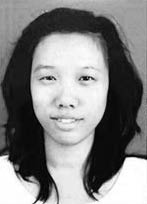
I know that nothing in a city as big as New York should shock me, even during a period of record-low violent crime.
But the rape and murder of Yu Yao (also spelled Yau, in some reports), a 23-year-old woman who came over from China just two months ago, was enough to snap me from my normal Monday night routine.
Maybe it was the that-could-be-me element: It was only 9 p.m. on Sunday, May 16 when Yu was attacked, while walking back from the grocery on a relatively busy street in Flushing.
Maybe it’s the pure brutality of the killing: Her attacker smashed her face with a pipe, then drug her into an alley to beat and rape her. (some reports say that a surveillance tape shows several passersby apparently ignoring the attack) Yao was in a coma for a week before life-support was pulled on May 22.
Maybe it’s the hard-working immigrant angle. She reportedly moved here just 2 months ago on a student visa to live with a distant uncle, worked in a nail salon, and hoped to become a lawyer. After the attack, authorities frantically tried to find her parents half the world away to tell them what happened. And, presumably, to know whether or not they wanted to keep Yu on life support. As a 23-year-old Chinese citizen, she may have been their only child.
I know Yu’s is just one death out of the hundreds of murders in New York annually. But the news editor in me suggests that this would’ve gotten more coverage if it was a young American woman who had been raped and left brain-dead on a Sunday summer night. Not out of bias, necessarily, but the cultural gulf and language barrier probably makes this story too difficult to cover in a 24-hour-news cycle.
I came to New York on easy circumstances, with a good job and good friends waiting. So I admire anyone who can take the risk of moving to this busy, beautiful but uncaring city, especially from a foreign country. It’s common to fail and leave here because of the expense or the noise or the cold. But to die like that, so cruelly in an alley?
 Carlos Salazar Cruz, the 28-year-old alleged murderer, was also an immigrant. He moved here two years ago from Mexico and worked at a fish market, according to the Daily News. His sister, contacted by the Daily News, said of Cruz: “”He never acted violently….We just don’t know why he would do this. We can’t explain it.”
Carlos Salazar Cruz, the 28-year-old alleged murderer, was also an immigrant. He moved here two years ago from Mexico and worked at a fish market, according to the Daily News. His sister, contacted by the Daily News, said of Cruz: “”He never acted violently….We just don’t know why he would do this. We can’t explain it.”
As someone who covered crime for a short time, I always wondered if I’d become completely desensitized to crime reports. And in New York, enough happens that even a crime like is just a blurb in the papers for a week (also in the local news today, a murder conviction in a triple-slaying at a Newark schoolyard involving guns, machetes, and rape. It was a nationwide story in 2007, but I don’t remember it) . I don’t know whether to feel better that yes, I can still be shocked. Or to be depressed that there is just no upper-limit to horror and tragedy, even when the victim is a complete stranger.
Update (5/28): China’s state English-language paper has a piece on the community activism following Yu’s death. It touches on the long-held perception that Asians won’t fight back:
A week after the rape, several Chinese residents in Flushing teamed up to patrol the neighborhood each weekday night. The team has since expanded to almost 40 members, one-fifth of whom are women, said Zhu Lichuang, president of the New York Chinese Associations Alliance. Zhu started the watch and is one of its volunteers.
“They (the criminals) choose this place because they think Chinese are usually obedient, like carrying cash and prefer to keep silent about incidents,” he said. “So we need to take some actions to show these people that they are wrong.”
Earlier this week, Yu Guihua, Yao’s mother, arrived at Newark airport from Heilongjiang province to the grim news of her daughter’s death. Yao’s father, who is in poor health back in China, has not still been informed.
“My child, you’re so well-behaved, why did you have such a fate,” Yu cried out. “My daughter was very pretty, why did he beat her like that?”
The New York State Assembly’s Grace Meng said several pedestrians witnessed the attack but walked away.
Having lived in Flushing for 23 years, Zhu said the rape case is the “most astonishing” crime he’s heard about in this neighborhood. “It’s not a premeditated crime, which however adds to its seriousness,” he said. “It exposes the problems we have had here for a long time – We Chinese are not unified enough, nor do we care enough about each other.”
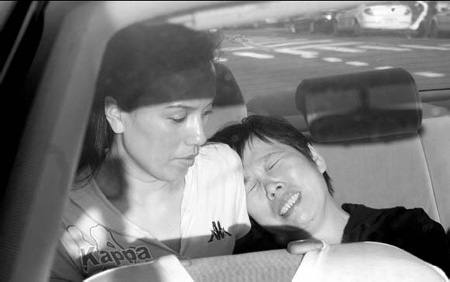
Yu Guihua (right), mother of murder victim Yao Yu, grieves on her way from Newark airport to the hospital where her daughter's body is. (Tan Lixian for China Daily)
Update (6/1): Carlos Salazar Cruz made his first appearance in Queens Supreme Court on June 1, and pandemonium broke loose. Guihua Yu, Yao’s mother, tried to attack Cruz in court, according to the Daily News. Cruz also said in a jailhouse interview with the NYDN that he was too drunk to remember the incident:
“I want to kill that man!,” Guihua Yu wailed repeatedly in her native Mandarin. “I want my daughter back!”
Guihua, 55, tried to pull away by grabbing at a courthouse bench as state court officers moved in.
Later, she was wheeled out of the courthouse on a stretcher and taken by ambulance to a nearby hospital.
During the brief morning hearing in Queens Supreme Court, prosecutors upgraded charges against Carlos Salazar Cruz to second-degree murder for the May 16 attack on Yu Yao, 23.
…
In a jailhouse interview with the Daily News, Cruz claimed he’d been drinking for two days and can’t remember the attack.
“I never wanted to hurt her,” he said. “I never even met her.”
Read more: http://www.nydailynews.com/news/ny_crime/2010/06/01/2010-06-01_mother_of_yu_yao_chinese_immigrant_killed_in_pipe_attack_charges_accused_killer_.html#ixzz0pi3QUoCL
Update: 4/28/2011 Nearly a year later, Yu Yao’s killer received his punishment. Carlos Salazar Cruz, now 29, received the maximum sentence of 22-years-to-life in prison for agreeing to plead guilty to second-degree murder. Even though Yu Yao’s murder was one of the too-many terrible crimes in this past year, her story has received significant attention, then, and today. Much of the coverage has focused on the dramatic confrontation between Cruz and Yu Yao’s mother, who had to be granted a special visa in order to both receive her daughter’s body last year and then now, to attend the sentencing of Cruz. The pure senselessness of the murder has not abated with the resolution, however. Cruz, both at the time of his arrest and during his sentencing, professed an inability to understand his actions that night and blamed it on drug use and alcohol.
Yao was our sun, our hope, our dreams, our future and our strength,” Guihua Yu told Carlos Salazar Cruz, who sat at the defense table with his head bowed.
“You beast!” she shouted during the nearly 45-minute tongue-lashing.
“I just wanted to be able to hold her and see her. What I saw was a corpse, a dead body,” she mourned.
“You have destroyed our lives,” Yu wailed. “Come back my daughter! My only child. I have lost my child. My child, my child.”
…
Cruz, another immigrant pursuing the American Dream, blamed his troubles on the alcohol and crack cocaine that buoyed him during his forced separation from his wife and child in Mexico.
“I ask for forgiveness,” Cruz said through a Spanish language translator. “God our Lord knows that I am completely repentant for my sins.”
Coding for Journalists 102: Who’s in Jail Now: Collecting info from a county jail site
This is part 2 of a 4-part series in introductory coding for journalists. Go here for the first lesson. This lesson and code will still be verbose, but will have a lot less hand-holding than the previous one.
